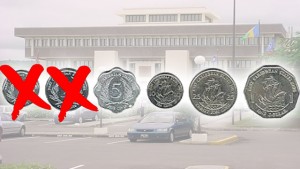 Residents have expressed discontent over the announcement by the Eastern Caribbean Central Banks’s (ECCB) to phase out the one-cent and two-cent coins as of tomorrow.
Residents have expressed discontent over the announcement by the Eastern Caribbean Central Banks’s (ECCB) to phase out the one-cent and two-cent coins as of tomorrow.
This means that commercial banks will no longer issue these coins to customers during transactions.
Nationals yesterday voiced their dissatisfaction with the pending change, especially as their cash transactions would have to be rounded off to the nearest five-cent increment.
Callers to the Voice of the People Programme said they stand to lose a great deal if they are forced to deal with unscrupulous merchants.
They are also querying whether systems will be put in place to monitor transactions.
“Wouldn’t it have been a better situation if they would clearly indicate the price instead of telling me the goods cost $12.11. Why not put in $12.10 or $12.15, why do they like to make our life so difficult and then you going to tell me you are going to round it off to the nearest five?” a male queried.
“I think cost of living is going to go up. Who is going to police the distributors that bring in the goods, because no one is going to be there to tell them they have to round it off to the nearest dollar or five-cents,” another noted.
“If the sellers are going to be changing every item on the shelf to reflect two-cents up or two-cents down, it would be unfair because everyone who should not benefit will benefit,” a female said.
The ECCB Monetary Council said the decision to withdraw the coins from circulation was based on the low purchasing power of the coins and the significant cost of producing and handling them.
It said the withdrawal will affect cash transaction only. Transactions using cheques and electronic payment, such as debit and credit cards, and wire transfers, will not be affected due to the fact that transactions using those methods of payment can be settled to the exact amount.
Although the coins will no longer be issued, they will remain legal tender up to June 30, 2020 and thus can be used for purchasing goods and services or exchanged at financial institutions for face value.
Meantime, Press Information Officer of the Prices and Consume Affairs Division, Simone Williams said the ECCB has prepared a set of rounding rules, which will allow retailers and consumers to conduct cash transactions without interruption.
This will be eventually placed in all retail, wholesale and other outlets on the island.
Williams also said while her division will be putting mechanisms in place to monitor some transactions, the onus will also be on the consumers to look out for his/her interest.
“You, as the consumer, also have to play a part in it; you have to be diligent in what you are doing too” Williams said.
